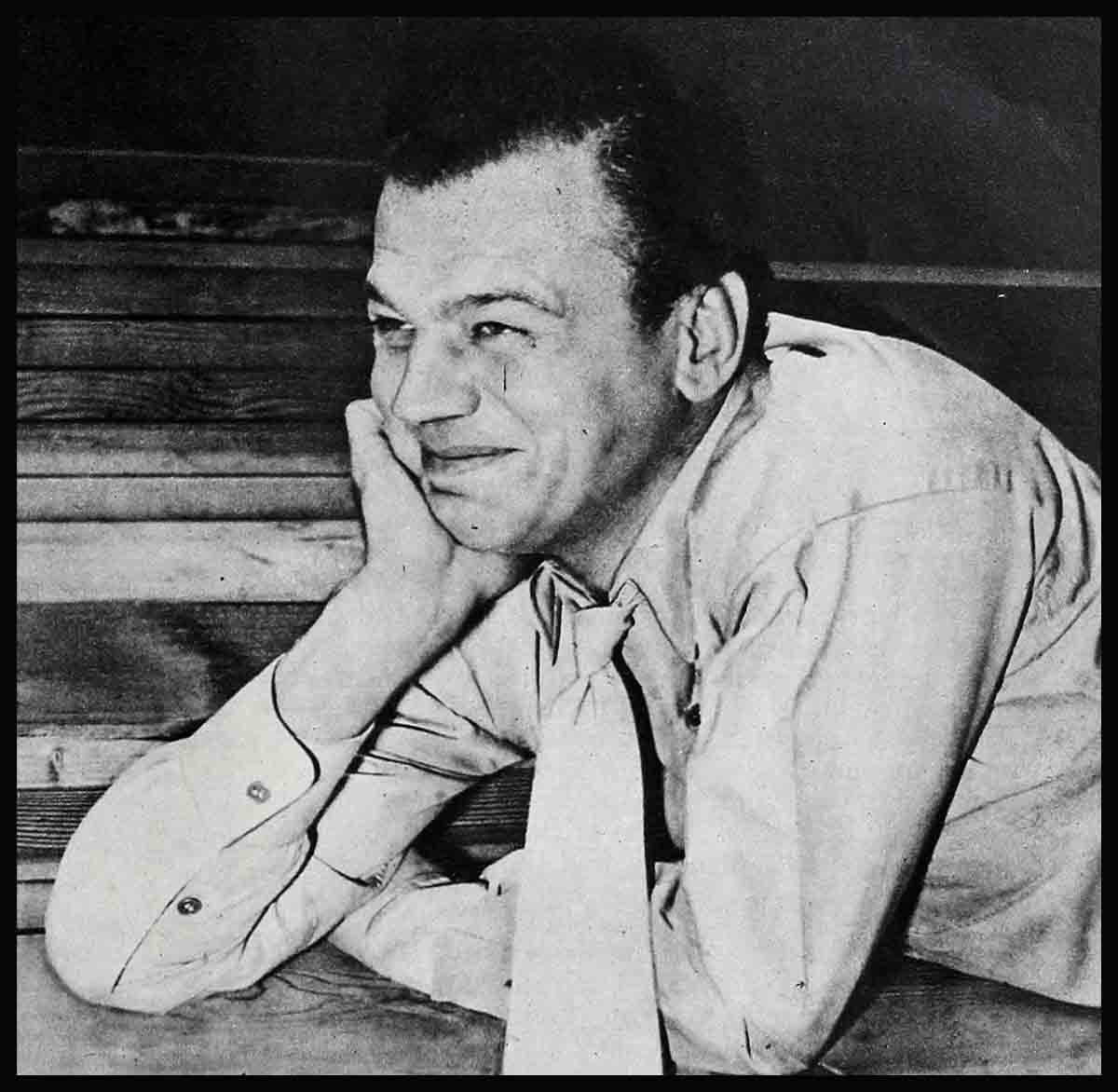
Confessions Of A Lazy Guy—Joseph Cotten
A fellow does so much in his youth out of sheer ignorance that it seems miraculous when some of the actions turn out to have been right.
Last month I did some looking back. That hindsight showed I had profited by exposing myself (more or less accidentally) to the trade I wanted to learn, and by having hard work wished on me. But I could find only one instance in my early youth where I figured things out right in advance—the plain facing-of-facts that Mrs. Cotten’s boy, Joe, was lazy and mustn’t duck work.
I guess I first began to think (I had to) when I bounced back from Boston in the midst of the national depression and for the fourth time tackled Broadway. Behind me were a Petersburg, Virginia, boyhood; a year of studying dramatic art; varied salesman jobs in Miami; two New York years as glorified call-boy for David Belasco and a flop in my first movie-test. Then came the priceless stage year in Boston, rehearsing every morning (preparing next week’s play) and playing every night.
Back in New York Lenore (whom I had married on the strength of the Boston stock company job) and I took a small apartment in Greenwich Village, and I stepped out, a genuine professional actor now, to land a job. The next reel might be titled, “Five Years Later”—but the Great Cotten Depression had fun and stuff.
True, the infrequent jobs I landed were usually radio bits at twenty-five dollars each, though once for a similar stint on a Helen Hayes airshow I drew seventy-five dollars. Celebration!
There were also partlets in stage shows—the kind of shows where you rehearse four weeks, without pay; open in New York, play four nights and—just like that—the theater landlord fences you out!
Lenore und I laugh now, and even laughed then, at events which ring a trifle grim. One Christmas someone sent us a large fruitcake, which we cached in a closet to hide it from droppers-in. Have you ever lived two weeks on a fruitcake diet? Positively gruesome! But we continually devised and practiced small follies, good for morale. Even if I only found funds enough for a cigar once a month, I always smoked a fine one—vicarious foretaste of the time when, I hoped, I’d be able to smoke that brand.
And—silliest of all—in the place in all the world where a car is least needed, Manhattan Island, we clung, through weal and woe, to the jalopy we had driven down from Boston. Our pocketbooks enforced a preview of gas rationing, but we had a car, and when gas money did turn up, we could take our friends riding. For instance, Orson Welles and his wife. Poor things, they didn’t have a car!
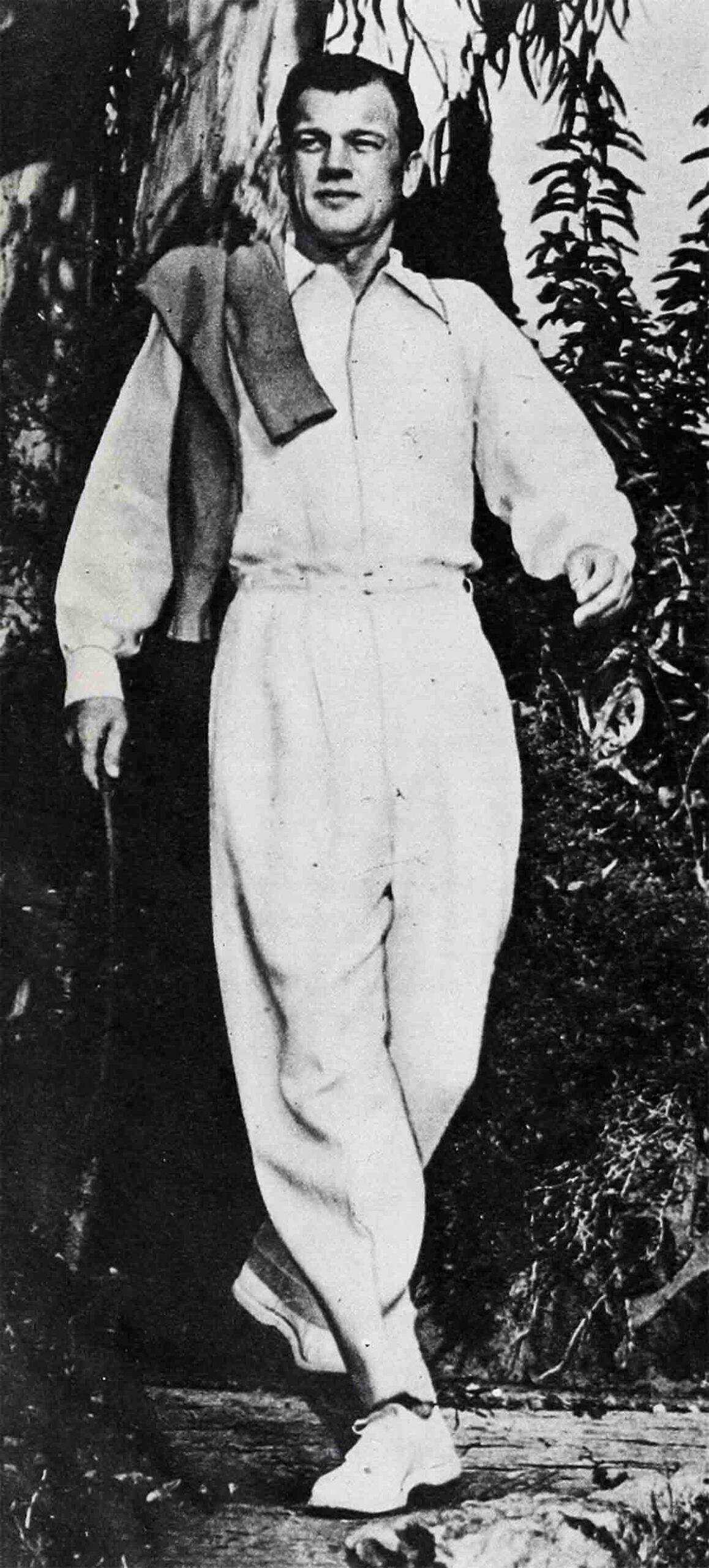
So much for fun!
When I’d been selling sundry commodities, I’d learned that I was lazy and inclined to make excuses for myself. Now I brain- waved the First Cotten Invention. I applied the eight-hour-a-day principle I’d used selling to trying to sell Cotten.
Working that hard when you’re out of a job may sound ridiculous, but it got me through the depression and kept me in yellow gloves, which no budding actor would think of going without. My invention paid off. There weren’t enough offices for me to consume eight hours each day visiting them. So—I visited them twice each day and, if my eight hours weren’t up, trod the sidewalks, buttonholing agents, advertising agency men (who controlled radio parts) and anybody who looked like a play producer.
My assiduous office-hunting acquired a nuisance value. Every now and then some receptionist would be prepared for me on the second time round and, saving her boss’s time, would call out, on my re-entry: “N.B.G.—Thursday night—7:30 — Goofleblatz show—twenty bucks.” Which was all right with Cotten!
As for the sidewalk-treading, twice I got bit roles from producers who had confused me with someone else! They had seen that egg-head and the hopeful phiz so often they thought I must be a working actor.
Most amusing of all, the semiannual screen tests I received in New York, never a trip to the Coast!) grew out of recommendations from the potential employers whose offices I was haunting. Since the men who recommended me (to other employers) for those endless tests never hired me. Cotten holds a record for personal charm in reverse, In those men who were recommending, “Give this boy a screen test,” I was inspiring a theme song: “Get Out Of Town!”
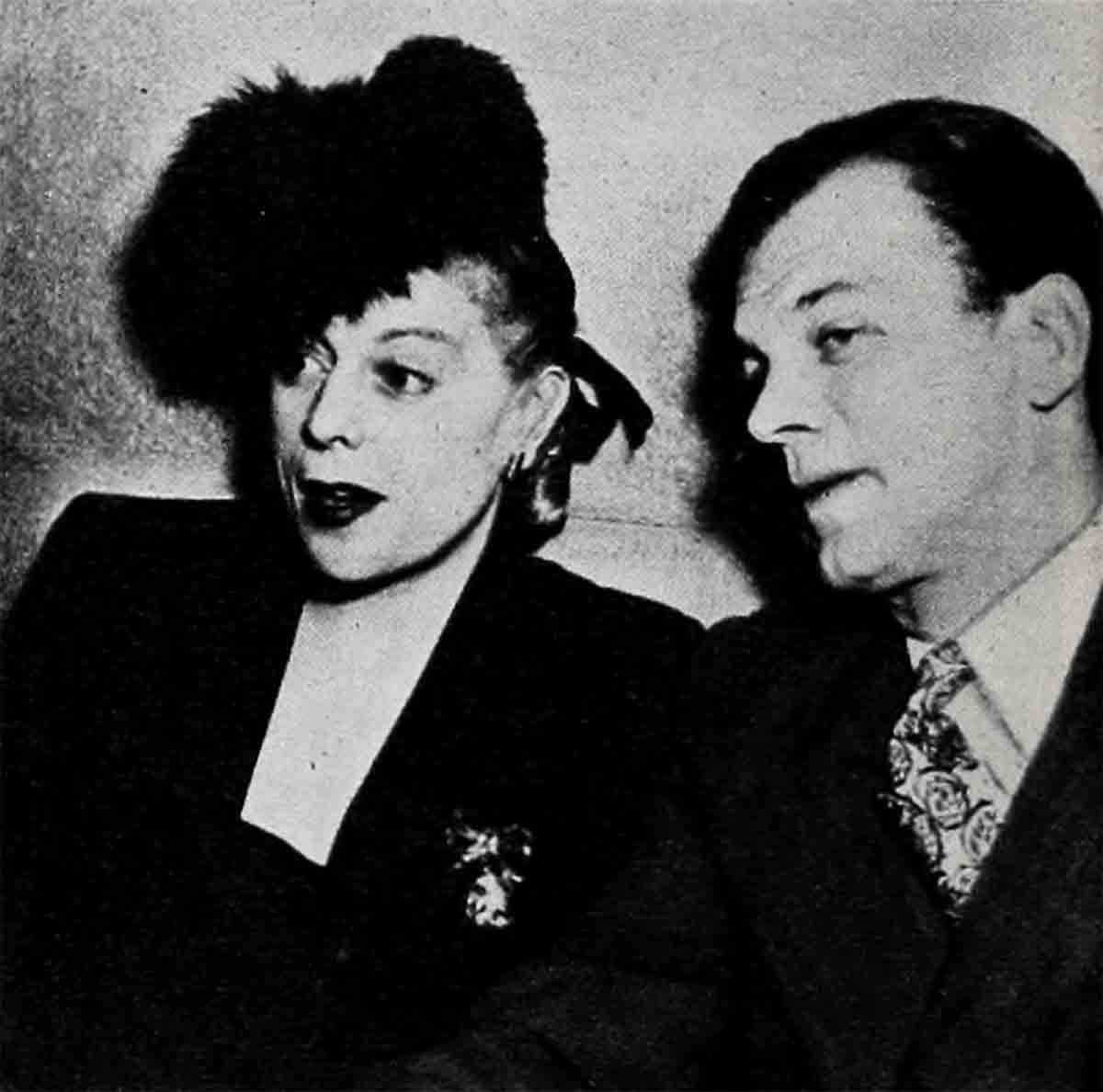
As it happened, it was a stage tryout that started my serious thinking and convinced me that your real break, in pursuing any line of work, isn’t external—it isn’t when someone notices you, or gives you a job. It’s internal, a change inside you, getting rid of some ineffective state of mind and acquiring an affirmative power in its place. That helps equip you, to take advantage of your so-called “luck,” when opportunity arrives.
Twice before I had had a chance to read for Brock Pemberton, who was choosing a juvenile lead for the Broadway show, “Three Times The Hour.”
Both times his reactions had been fine. “Good work, Joe! Swell reading!” Cotten was leading for the part. I hurried through the alley by the theater and bounded up the steps. As I entered, something in Pemberton’s friendly smile warned me, and that feeling we all know, of a tightening in the throat, hit me, while he spoke earnestly:
“Your readings were really grand. We all like the way you handle the part. But—we’ve decided to give it to Ben Lackland. Don’t feel too bad.” He patted my shoulder. “The role is a young reporter, you know. We wanted someone a trifle more rugged in appearance. It’s a strange way to lose a part, Joe, but you were just a trifle too good-looking.”
In such a situation your mind rushes to your own defense, protecting, trying to lessen the hurt. As I stumbled down the steps from Pemberton’s office, my thoughts were galloping faster than a Danny Kaye scat-song:
“Too bad, kid.” I seized on Pemberton’s crumb of comfort. “Think of losing a part because you’re too good-looking. What rotten luck!”
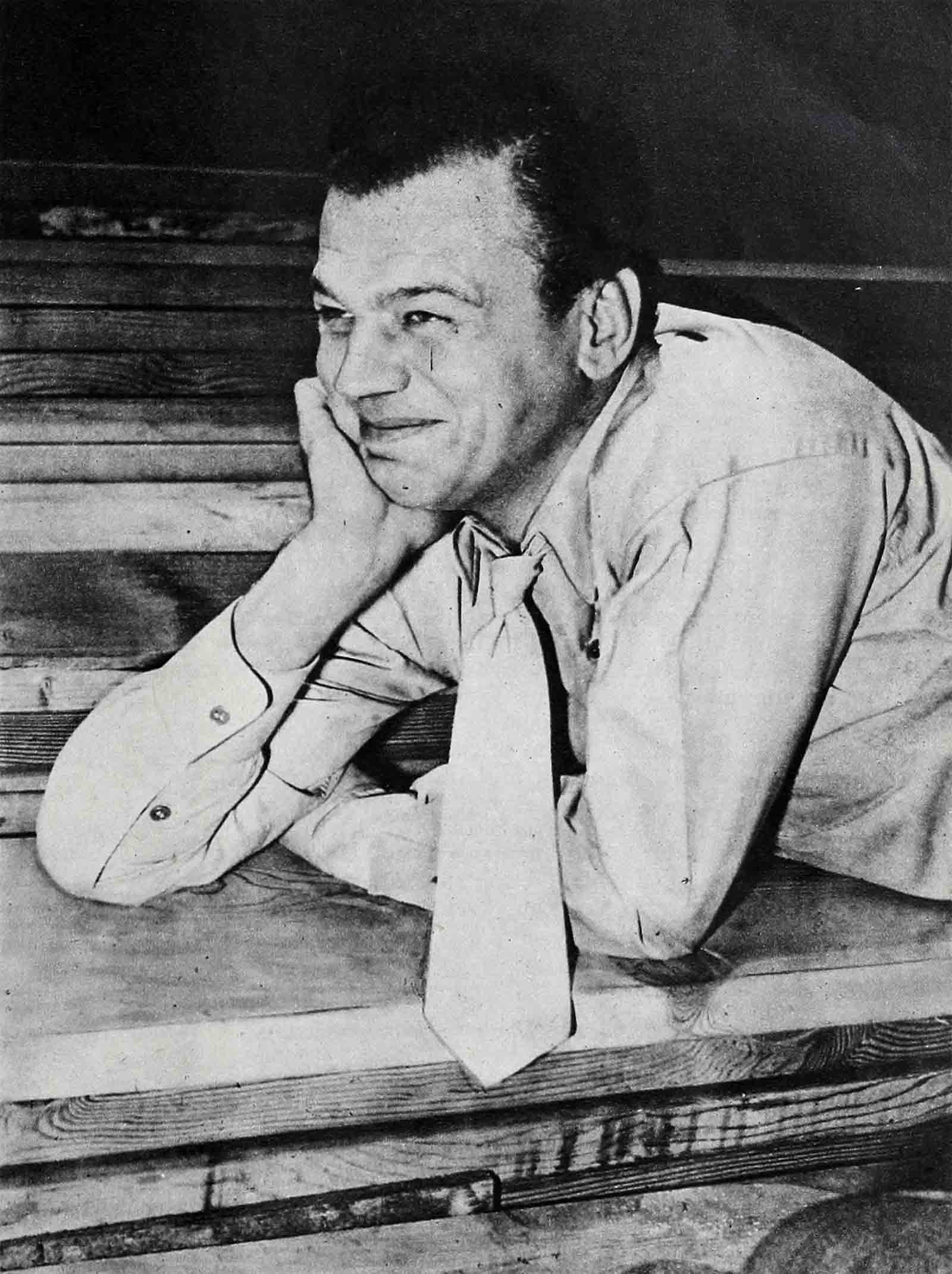
Some kind angel, as I turned into Forty-fourth Street, tapped me on the shoulder, and I stood still, while pedestrians brushed by. “You dope!” I told myself. “Producers hire juvenile leads partly because they’re good-looking. And Lackland has plenty of looks. What happened is, he read the part better than you did. Go home, look in the mirror at that pan, chump, and laugh.”
I remembered the “egg head” verdict.
I was killing, there on the sidewalk, the habit of alibi-ing myself. That first letdown, when you banish “luck” from your calculations, is bleak. Even though belief in luck is a false prop, it sometimes seems comforting!
But I took a private oath, that moment, not to kid Cotten any more. A little later when a producer, turning me down, told me, “You have too much talent, too early,” I just laughed.
Those kindly brush-offs are cushions to oblivion.
Discouraged, I wrote my mother what must have been virtually a small-boy letter, telling her every single worry and foreboding.
Mother replied calmly: “Why don’t you try something else?” The letter intimated, sensibly enough, that, since I was going through so much spiritual and mental pain, and getting nowhere, maybe I could find peace of mind and make good at, say, driving a truck.
That jerked me up again. It forced me to ask myself, “How badly do you want to be an actor? Do you want to keep to this road, and stop whining? Or—?”
As you know, there was no happy, fictional twist ahead to save the situation. I didn’t get, next day or week, a better job than the Pemberton one. It was some weeks before I got any job, five lean years before I landed a really good role.
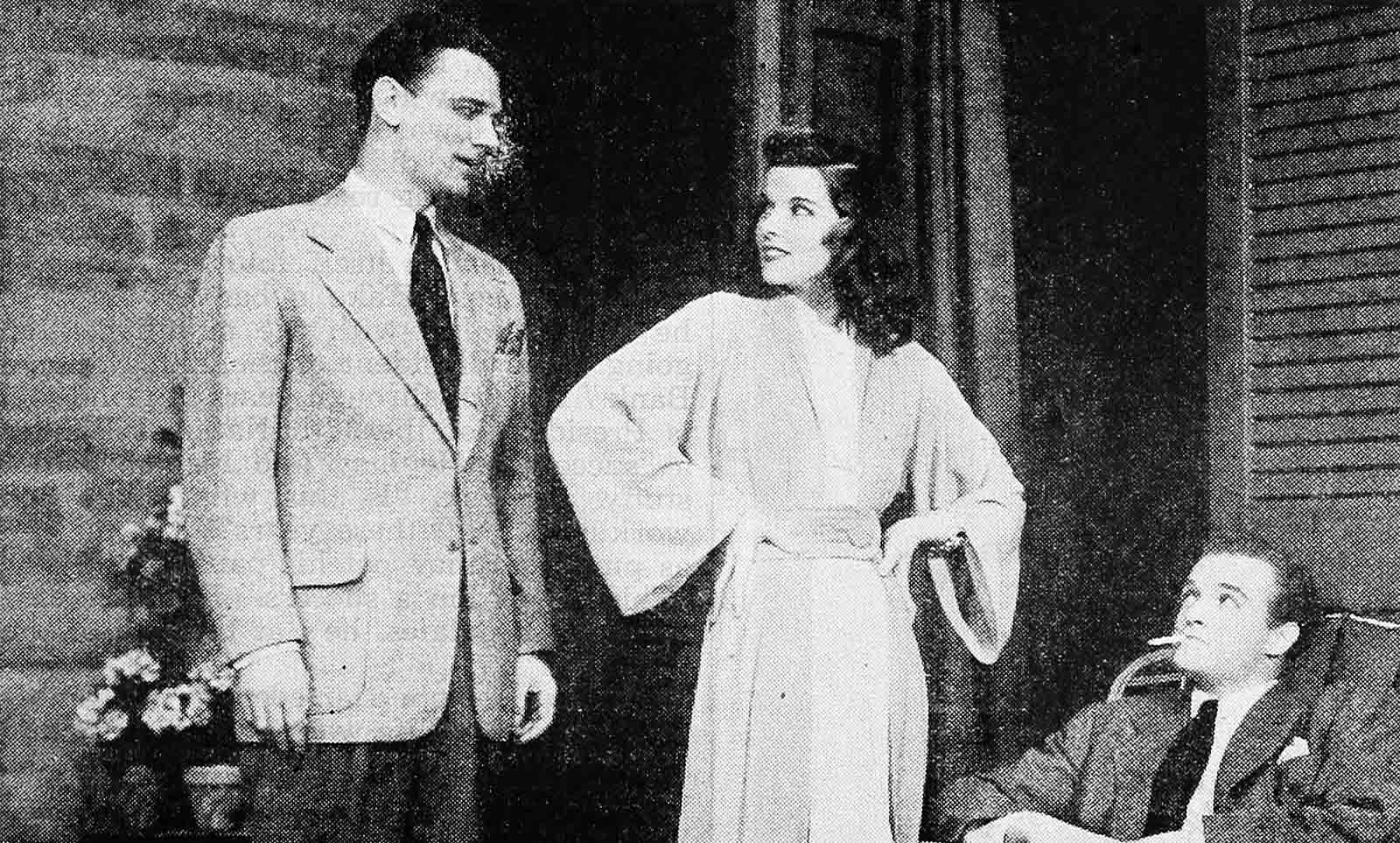
But, believe me, shortly after you throw luck out of your philosophy—as soon as you accept the old eight-hour-a-day tenet, and realize that learning how turns the magic key—you feel appreciably stronger and, except for a normal human slump once in a while, you can whistle while you draw on your yellow gloves.
I landed some minor roles—and finally Broadway Producer Crosby Gaige gave me a definite boost with the juvenile lead in “Accent On Youth.” Meanwhile, that Orson Welles who had been my not-too-prosperous neighbor two years in Greenwich Village was launching his meteoric American career. (When scarcely old enough to play a Dead End Kid, he’d made a name for himself in Ireland.) I’d spotted Orson for gray matter the first time I’d ever observed him (on a sustaining program) at a broadcasting station; had even bored my wife talking about his brilliance—though not after she met him; nobody is bored who meets Orson!
It therefore was with excitement and pleasure that I accepted the Great Welles’s invitation to work with him in the Mercury Theater, and it was Orson, also, who invited me to Hollywood, to act in “Citizen Kane,” Ironically, I who, at various intervals, had wasted uselessly many hundreds of feet of screen test film, came to my first Hollywood job without any screen test at all.
What a first two days! Since I was to play an aged gent in a wheel chair, I had to get up at 4:30 so they could build on my rubber face, fit my wig and pluck my front hair—hair by hair—to keep the pate looking suitably bald.
Orson, who was directing as well as playing the lead, had broken an ankle, so there we were, each in a wheel chair, with a bold, controversy-making movie about to start shooting and Cotten facing, for his opening scene, a three-minute monologue. That’s a lot of talk—three full pages of script.
Unfortunately I faced a camera as well as those three pages, and about 985 people, it seemed to me, were standing around. I’d do all right until, in the middle of my long speech, the camera, looming like a monster, would dolly up—rolling noiselessly as if it were creeping forward to eat me—right in my face. Each time I froze in the scene and quit!
I did manage to get on through some of them, but Orson is a perfectionist and set a Hollywood record by shooting sixty takes. As I staggered out of my wheel chair at 7 p.m. to go to the hotel where I had arrived the night before, a grip tried to comfort me. “You’ll never see another day in Hollywood, Mr. Cotten,” he assured, “just like that.” Nevertheless, I walked the hotel-room floor, debating whether to hop a plane back East; didn’t sleep all night and reported at 6:00 next morning to don rubber goo and wig again.
Orson then explained: The hairline hadn’t photographed right after all; the sixty takes were useless. Begin again!
Conscious life seemed to cease for me. We made two takes and I heard a voice, as from afar off, saying “Print that.” Someone shook my shoulder, “You’re through for the day, Mr. Cotten.” The time was 9:30 a.m.
My friend the grip had been right: I had “run the gamut” of Hollywood experience in two days. I’ve never seen another day as hard as my first, nor another as easy as my second.
What you actually do, when finally you are fortunate enough to reach working surroundings where people with knowledge perform all around you, is to learn, learn, learn. Life really becomes work, work, work. In between pictures, one’s radio, publicity chores and the normal things every person does to help the war effort keep an actor so busy that it seems a relief, so far as work is concerned, to get into a new picture! What he has actually won are three things—that opportunity to learn; more pleasure in his work as he does grow, and freedom from the old worry about eating-money. My big personal disappointment is—I don’t care a damn any more about wearing yellow gloves!
Excitement comes in odd, new ways sometimes.
Not long ago I had the clock-stopping experience of being asked to write a letter on “Success” for “The Missile,” school paper of the Petersburg, Virginia, high school, which I attended. A letter to Congress, I might have done easily. But, to the girls and boys of your own old school—that requires thought. As some Oriental philosopher forgot to say, “The keen eye of youth may be a swift kick in the slacks.”
I worked three long evenings on the letter, and three-fourths of it consisted of this paragraph, the principle of which affects, I believe, not only a career but all-around happiness in life:
“Real ambition does not have anything to do with success, because true ambition is really an urge felt always to perfect oneself in some field or other—and perfecting oneself is a never-ending job. ‘Success’ implies that a person regards himself as having reached the ultimate goal in whatever he may want to do, while ambition never relaxes in trying to do something better. Whenever a person comes to regard himself as successful, he has lost the best thing that life can give him. We should never say: ‘Since I’ve accomplished this, I must be a success.’ Even thinking such nonsense means that you’ve done the best you can ever do, and there are very few people in the world who can truthfully say that. It is one thing to feel satisfaction in knowing that you are on the right track toward your goal, but it is something very different ever to look on yourself as having reached final success in a career.”
That translates itself into any walk of life you choose. Take a banker. Suppose he starts in life with the ambition, “I’m going to be President of the 17th National Bank.” He goes through years of grind and is President of the 17th National Bank—a “success.” He may find his job rather stuffy and ask, “Is this what I’ve been working for, all these years?” Or, pleased as punch he may pat his paunch and say, “This is me. I’m a success.” In either case this man vegetates, he’s at the end of the line.
But—suppose he started with real ambition. His aim in life was to learn more and more about the wise handling of money, the way to make it serve the community, as well as merely add up interest. He’s more likely to become President of the 17th National. And he’ll be just started. The funds of the bank will clear slums, help small business, reach out in the helpful way that money can. And Brother Banker will keep on learning, enjoy life and—fortunate man—never know he’s a “Success.”
A great professor of chemistry once told me, “if I don’t study each night. I’m an out-of-date teacher next day.”
In Hollywood, those stars who have been around a long while and seem to grow better with time are the ones who regard “stardom” merely as an opportunity to learn more.
Such a stance will help you vitally on the way up. You will follow the very smart course of valuing opportunity to learn—not just to earn money—as the best test of your early jobs. Jennifer Jones in “Duel In The Sun,” is a fine example of this.
She had worked toward acting since childhood. When she reached Hollywood, though better grounded than most newcomers, she got only minor roles.
Not only was Jennifer not getting anywhere, but she recognized that she was learning nothing. So—back to New York and two years more of work and study. Then came the fateful day she made sufficient impression at the Selznick New York office to win an interview with D.O.S.
In spite of all this the wise Selznick had her coached and trained two more years before he brought her to the Coast and celluloid. That explains why real ambition, instead of the success-wish, is so important. It explains the “luck” (I’m sure you read about it!) of the girl who in her first Class A movie, “The Song of Bernadette,” won the Academy Award for best actress performance of the year.
Jennifer’s record is of particular application as of today. No longer is Hollywood the best place to make your initial bid for screen work. Studios can afford to buy proved products, proved people, at high prices, and do. If you want to write for films, “expose” yourself first to any and all kinds of writing. If you want to design dresses—learn somewhere else. If you want to act—“expose” yourself, not to Hollywood first, but to acting.
That last is important. Nearly every community now has local amateur theatrical groups. Get in one. Do anything they’ll let you do around the place.
Winning to the inside of a Hollywood studio unprepared is a virtually hopeless gamble after you get inside. If you’re good enough in your home town, chances are that the excellent talent scout system will find you. Or, if after training and experience, you do come out here for that “external” break, you’ll be able to cash in when you get it. Remember all these things apply equally to any profession; banking, running a shop, writing—all forms of daily work that are also self-expression. (And what forms aren’t?)
So here is the score as Hindsight Joe sees it: Make learning and growth, not some phony “success,” your goal; expose yourself to people who are daily doing what you want to learn; never make inward excuses for failure; be sure to pick your early jobs (that’s a laugh, from me, who had little choice) not by their earning power but by their training value; set yourself a work standard, or a preparation standard, of at least eight hours a day. Expect more work and more chance to learn, when you reach what now looks to you like “the top.”
Sounds like Ol’ Sobersides Joe. Don’t believe that! I’m for fun, all along the road, and it’s there, along with the work.
In whatever line you choose, set your sights high and, if it’s eventually for out Hollywood way, and the town doesn’t give me the heave-ho before you get here—
I’ll see you at Mocambo.
THE END
—BY JOSEPH COTTEN
It is a quote. PHOTOPLAY MAGAZINE JULY 1945




